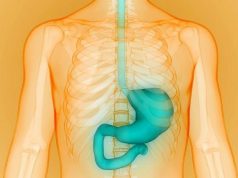FMT group had lower BSI risk, fewer days in hospital, better overall survival than antibiotic group
TUESDAY, Nov. 5, 2019 (HealthDay News) — Patients with recurrent Clostridioides difficile infection (CDI) who receive treatment with fecal microbiota transplantation (FMT) are less likely to develop a primary bloodstream infection (BSI) than those receiving antibiotics, according to a study published online Nov. 5 in the Annals of Internal Medicine.
Gianluca Ianiro, M.D., from the IRCCS Università Cattolica del Sacro Cuore in Rome, and colleagues examined the incidence of primary BSI in patients with recurrent CDI treated with FMT versus antibiotics in a prospective cohort study involving 290 inpatients with recurrent CDI.
Of the patients, 109 were treated with FMT and 181 with antibiotics. The researchers found that BSI developed in five patients in the FMT group and 40 in the antibiotics group. Comparative analyses were limited to the matched cohort (57 patients per treatment) due to differences in many baseline characteristics for patients treated with FMT versus antibiotics. Compared with the antibiotics group, the FMT group had a 23 percent lower risk for BSI, 14 fewer days of hospitalization, and a 32 percent increase in overall survival.
“Should our results be confirmed by larger, randomized studies, FMT could be considered an effective treatment option to both cure recurrent CDI and prevent some of its complications, including BSI,” the authors write.
One author disclosed financial ties to the pharmaceutical industry.
Copyright © 2019 HealthDay. All rights reserved.








